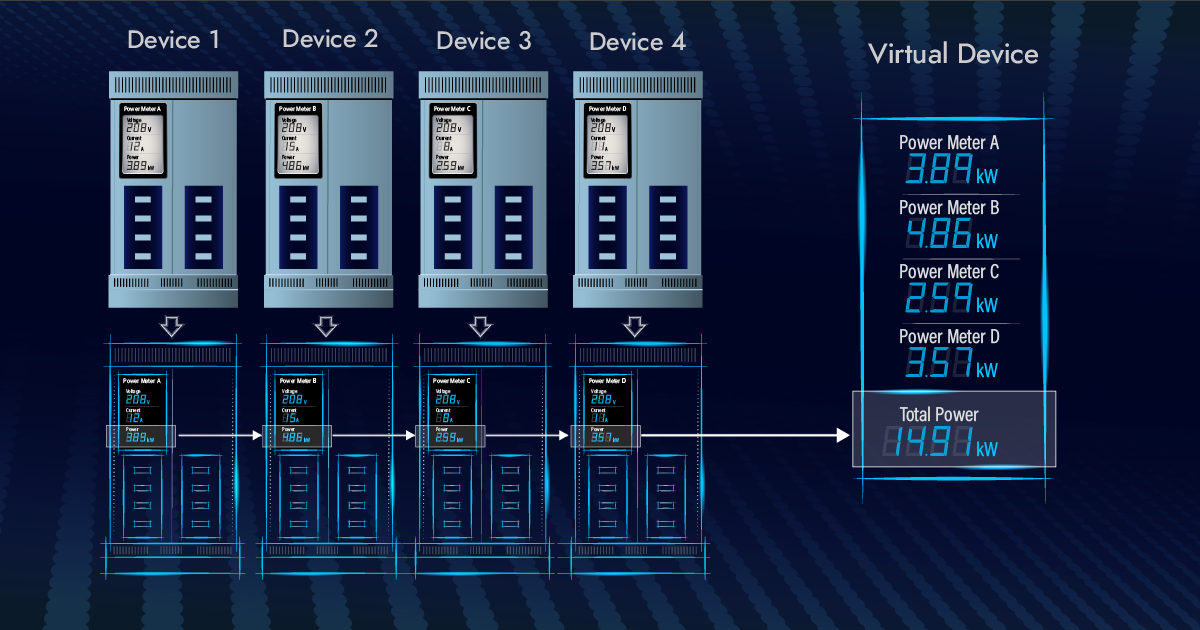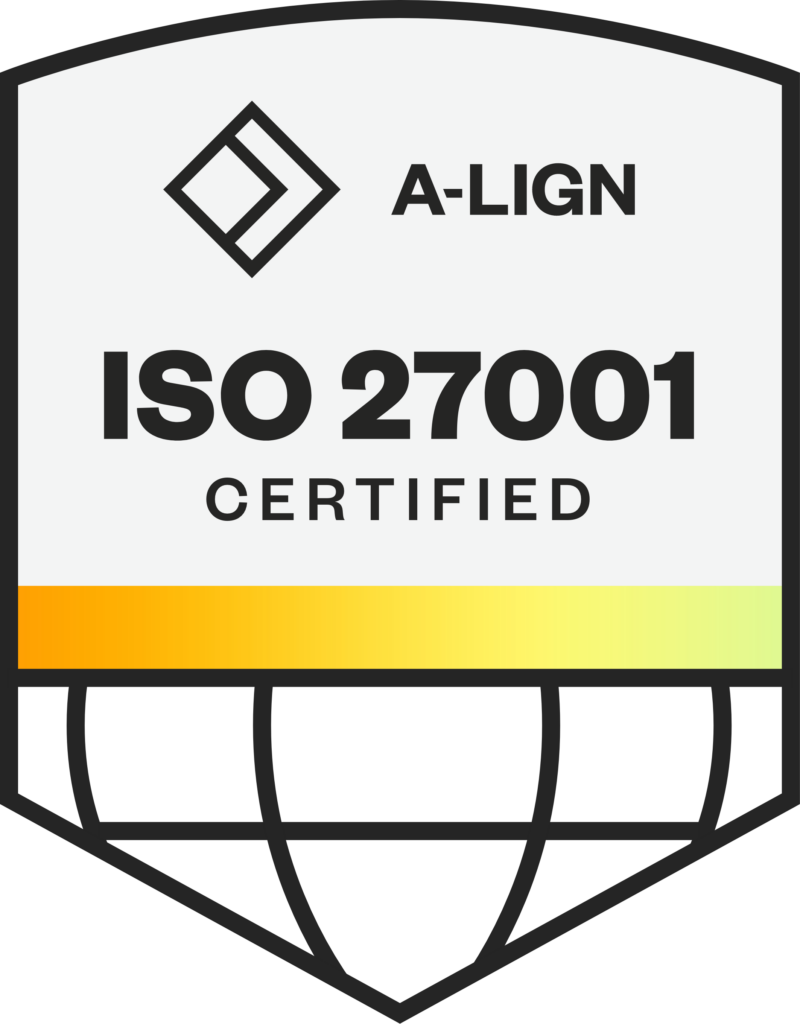The data center landscape is evolving rapidly, with increasing reliance on virtualized devices to enhance efficiency and scalability. However, without a unified monitoring solution, critical infrastructure remains siloed, leading to inefficiencies, higher costs, and increased risk of downtime. Industry leading データセンター・インフラ管理(DCIM) solutions such as Modius® OpenData® bridge this gap, integrating real-time data from physical and virtual devices to unlock exponential value.
A virtual device only exists in software. It is a place to gather data from many physical devices to perform calculations and evaluations across all the devices. For example, a virtual device can be set up to collect the active power readings from many physical power meters. With this data available in the virtual device, a new point can be created to calculate a total of all these active power readings. The resulting total active power point will be logged just like any other point in the system and can be displayed in dashboards or reported on in analytics.
Challenges in Managing Data Center Infrastructure
Modern data centers rely on a combination of physical and virtualized devices, but without centralized monitoring, managing this infrastructure can be challenging. Operators often face:
- Siloed Data – Power, cooling, and environmental sensors are managed in separate systems, making it difficult to gain a holistic view of infrastructure health.
- Manual Efforts & Inefficiency – Tracking power usage, redundancy, and performance metrics often requires manual spreadsheets or isolated monitoring tools.
- Lack of Predictive Analytics – Without real-time intelligence, inefficiencies go unnoticed, increasing downtime risks and operational costs.
Facilities often struggle with power aggregation gaps, lacking a single source of truth for total power consumption across data halls, which creates inefficiencies. Redundancy risks arise due to the manual tracking of circuit pairs, making it harder to ensure power reliability in the event of an outage. Additionally, inaccurate Power Usage Effectiveness (PUE) calculations remain a challenge as real-time facility and critical load monitoring are often absent, leading to imprecise PUE metrics.
How DCIM and Virtual Devices Create Unified Insights

Virtualized Device Use Cases in Data Centers
One of the key benefits of DCIM solutions is the aggregation of data to make smarter decisions. Virtual devices combine multiple data sources, creating meaningful metrics that offer a more complete picture of data center health. Additionally, AI-driven analytics enable proactive monitoring by predicting failures, optimizing capacity, and reducing energy waste before issues escalate. Automated alerts and summaries, driven by centralized monitoring, ensure timely responses to critical events, such as power failures, load imbalances, and capacity thresholds.
- Total Power Tracking – Virtual devices aggregate power metrics from multiple electrical lineups, providing real-time total power insights at the data hall, building, or site level.
- PUE & Critical Load Monitoring – Automated calculations ensure accurate PUE metrics, and other KPIs, helping operators continuously optimize energy efficiency.
- Circuit Pair Monitoring for Redundancy – DCIM enables real-time monitoring of rack power balance, preventing failures in case of a power source loss.
- Generator Remaining Runtime – Real-time data from fuel monitors, generators, and power meters allows for precise generator runtime estimations.
- Customer Load Management in Colocation Environments – Virtualized tracking of customer energy usage streamlines billing and ensures fair allocation of resources.
How Modius OpenData Enhances DCIM
OpenData is built to solve the challenges of managing complex data center infrastructure. With real-time monitoring and seamless integration across multiple devices, OpenData provides a single-pane-of-glass solution for data center operators. Key advantages include:
- Seamless Real-Time Integration – OpenData unifies disparate devices and data sources into a comprehensive monitoring platform.
- Advanced Analytics & Automation – Predictive intelligence enables real-time performance monitoring, trend analysis, and proactive alerts.
- Scalability for Multi-Site Operations – Designed for remote, multi-site monitoring, OpenData is ideal for data centers with geographically distributed infrastructure.
- Flexible & Customizable Modules – Users can tailor the Monitoring, Power, Analytics, and Assets modules to meet their specific needs.
- Interoperability with Existing Systems – OpenData supports standard protocols like Modbus, BACnet, SNMP, REST APIs, and other proprietary integrations.
- AI-Powered Anomaly Detection – The OpenData AI/ML module proactively identifies performance issues before they escalate.
Key OpenData Features That Optimize Data Centers
- 電源管理 – The system provides real-time insights into power flow, conducts failover testing, and runs load simulations, all of which help prevent outages and ensure stable operations.
- Real-Time Monitoring – Intelligent alert routing and escalation are implemented to facilitate proactive incident response, ensuring potential issues are addressed before they escalate.
- AI/ML for Predictive Insights – The use of AI and machine learning detects performance anomalies early, preventing disruptions and improving both uptime and overall system efficiency.
- API & Third-Party Integrations – Seamless data exchange with BMS, BAS, and IT systems enhances interoperability. OpenData has robust multi-protocol support that ensures effortless integration without extra hardware or customizations.
Ensuring Long-Term Efficiency with OpenData
Virtualized devices and DCIM unlock exponential value by providing actionable insights that drive efficiency, scalability, and reliability. Modius OpenData offers a scalable, AI-driven solution for managing power, cooling, and operational performance in real time. By leveraging OpenData, data centers gain unparalleled visibility, proactive control, and cost savings—ensuring long-term operational success.
Discover Modius OpenData Today
Explore how OpenData can be your reliable partner for unlocking exponential value. Download the Product Brief for OpenData here and take the first step toward a more efficient, reliable, and future-ready Data Center Infrastructure Management solution.
We are passionate about empowering our clients to run more profitable data centers while providing unmatched visibility into operational data. Modius has been delivering DCIM solutions since 2007 and is based in San Francisco and proudly certified as a Veteran-Owned Small Business (VOSB). Contact us at sales@modius.com or (888) 323.0066 to learn more.




